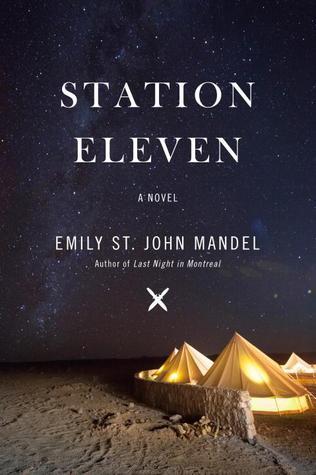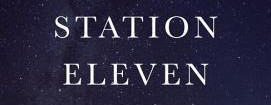 Station Eleven by Emily St. John Mandel
Station Eleven by Emily St. John Mandel Narrator: Kirsten Potter
Published by Knopf Doubleday Publishing Group on September 9, 2014
Genres: Apocalyptic & Post-Apocalyptic, Science Fiction
Pages: 352
Length: 10 hours 41 minutes
Format: Audiobook
Source: Library




2014 National Book Award Finalist A New York Times Bestseller An audacious, darkly glittering novel set in the eerie days of civilization's collapse, Station Eleven tells the spellbinding story of a Hollywood star, his would-be savior, and a nomadic group of actors roaming the scattered outposts of the Great Lakes region, risking everything for art and humanity. One snowy night Arthur Leander, a famous actor, has a heart attack onstage during a production of King Lear. Jeevan Chaudhary, a paparazzo-turned-EMT, is in the audience and leaps to his aid. A child actress named Kirsten Raymonde watches in horror as Jeevan performs CPR, pumping Arthur's chest as the curtain drops, but Arthur is dead. That same night, as Jeevan walks home from the theater, a terrible flu begins to spread. Hospitals are flooded and Jeevan and his brother barricade themselves inside an apartment, watching out the window as cars clog the highways, gunshots ring out, and life disintegrates around them. Fifteen years later, Kirsten is an actress with the Traveling Symphony. Together, this small troupe moves between the settlements of an altered world, performing Shakespeare and music for scattered communities of survivors. Written on their caravan, and tattooed on Kirsten's arm is a line from Star Trek:
The best description I can give for Station Eleven is that it is an experience, and one that I really enjoyed. Perhaps that sounds vague or general, but honestly the way this story is told is what sets it apart. The story is told with disjoint storylines which really highlights the stark contrast in life before and after most of the world’s population is wiped out by the Georgia Flu, a fast spreading deadly virus, plague, epidemic, whatever you want to call it. And when I say this thing is fast, I mean really fast. From exposure to death is measurable in hours, so there’s not even time for safeguards or emergency plans to be put in place. Actually it’s so fast, there’s not even enough time for a Chicken Little type media frenzy where everyone is panicking about the end of civilization. There’s news reports, but by the time realization may set in that this is not just another sensationalized story, but a true threat, the world we know now is forever changed.
The story is pieced together from before and after the plaque/epidemic. It is quite interesting to see how it all comes together and how the characters are connected, what the common threads will be between the characters we meet from the two timeframes. One of these common threads is a comic book, that quite frankly, I wish I had a copy of. (Since the name of the book is one of the comic, I don’t think that should be a spoiler, but a hint to pay closer attention to it!)
There’s not much focus on the time frame of the actual event that changes everything. The real focus is on the change in people and life, how technology and civil order impact our lives to the point where if they are stripped away, you wonder what is left? How would we function and survive on our own? Honestly, it’s easy to pick out the ways our lives are ‘easier’ or ‘better’ now. First and foremost on that list is medical care (obviously). But what I really appreciated was the glimpses of how our world can be isolating despite how interconnected we all are with our devices and social media in this world of instant gratification and celebrity voyeurism. I’m not saying that as a criticism to our world today, but an observation. If everything collapsed, and you had to fight for your own survival and a place to stay, would you have the luxury of being interested in what Celebrity Bob wore today? Or who Celebrity Jane told off in a heated moment? I doubt it.
Another part of this book that I really just loved was the Museum of Civilization, where people could place and look at all of the “things” we have in our lives today that become truly just pointless objects when you take away the ability to use them. They become reminders of what the world used to be, what people used to be able to do, things that seem more like magic than anything else.
I also really enjoyed the characters and relationships in this book! They are what made me care and want to keep reading, they are what made the story real. So yes, I loved this one, and highly recommend it.
Quick Audiobook note: Loved this on audio, the narrator did a fantastic job. Skipping timelines and POVs can tricky to follow sometimes when listening instead of reading, but this one flowed very well.


This book just doesn’t call to me. Yet everyone likes it. And I have been surprised before.
Nathan (@reviewbarn) recently posted…YA Fantasy Review: ‘The School for Good and Evil’ by Soman Chainani
I have to admit, I know I shouldn’t judge a book by its cover, but this one just made me pass it over until I read reviews. That said, it is still a post-apocolyptic like book, so I would expect you to approach it with some hesitancy 🙂 Or is it mainly dystopian books that generally don’t work well for you?
Lisa (@TenaciousReader) recently posted…Review: Station Eleven by Emily St. John Mandel
This was my favorite book last year. I just loved tbat it was such a “quiet” story, since I tend to read lots of action centric books. And me too, I loved the Museum of Civilization!
Tammy @ Books, Bones & Buffy recently posted…A Superhero and his Dog: BITTER SIXTEEN by Stefan Mohamed – Review
Agreed! It’s so nice to get a story like this sometimes.
Lisa (@TenaciousReader) recently posted…Review: Station Eleven by Emily St. John Mandel
I also wasn’t drawn to this – probably because of the cover (although there’s nothing wrong with it at all!). But, if you loved it then it has to be added to the wishlist! Good enough for me.
Lynn 😀
Lynn recently posted…“Tomorrow, I’ll think of some way to get him back. After all, tomorrow is another day.”
Personally, I’m not a big fan of the post-apocolyptic stories, so when I first saw this was coming out, I pretty much pushed it to the side right away. Wished I hadn’t . Ever since the release, I have only heard more and more good about this. Feel like I really missed out on something big. Think I may have to pick up the paperback in a few months.
DJ (@MyLifeMyBooksMyEscape) recently posted…Book Review: Nyphron Rising (Rise of Empire: Part 1 of 2) by Michael J. Sullivan
So many people loved this book, including my coblogger Tiara who wrote a glowing review. Something still doesn’t call me to it though, like Lynn says, maybe it’s the cover. It’s a great cover, but just seems to disconnected to the kind of story I know it to be, and its description. But if I see this on audiobook at my library, I’ll probably put it on my wishlist to check out when I’m looking for a new listen.
Mogsy @ BiblioSanctum recently posted…Audiobook Review: The Once and Future King by T.H. White
[…] St. John Mandel – Author of Station Eleven This book was released in 2014, but was new to me this year. This is one of the most memorable […]